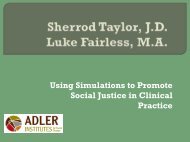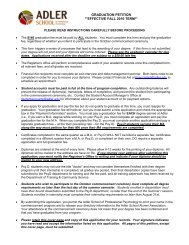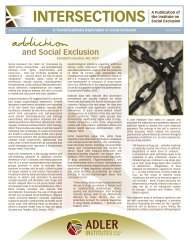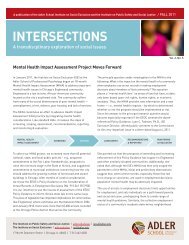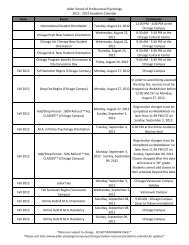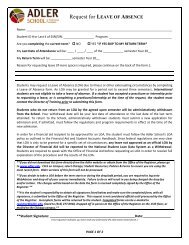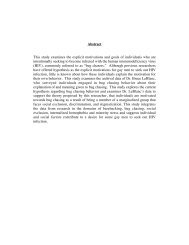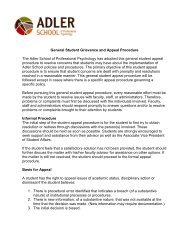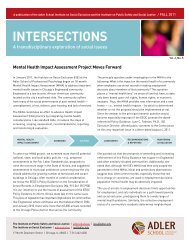Adler School of Professional Psychology Catalog 2008 – 2009
Adler School of Professional Psychology Catalog 2008 – 2009
Adler School of Professional Psychology Catalog 2008 – 2009
You also want an ePaper? Increase the reach of your titles
YUMPU automatically turns print PDFs into web optimized ePapers that Google loves.
Department <strong>of</strong> Training and Community Service assists students in identifying<br />
appropriate sites for internships.<br />
(Students must enroll three consecutive times.)<br />
743-748 Doctoral Internship-Half Time 0 Credits<br />
Prerequisites: Successful completion <strong>of</strong> required qualifying examinations,<br />
doctoral dissertation proposal and permission <strong>of</strong> the Director <strong>of</strong> Clinical<br />
Training. Following completion <strong>of</strong> academic and practicum requirements,<br />
doctoral students must complete an internship <strong>of</strong> a minimum <strong>of</strong> 2,000 clock<br />
hours <strong>of</strong> training over a 12-24 month period. Most internships require a oneyear,<br />
full-time commitment. A two-year, one-half time internship may also be<br />
obtained. The internship is designed to provide an intensive clinical experience<br />
building upon the course work, practicum experiences, and skills supervision<br />
completed during the first four years <strong>of</strong> the doctoral program. The Department<br />
<strong>of</strong> Training and Community Service assists students in identifying appropriate<br />
sites for internships.<br />
(Students must enroll six consecutive times.)<br />
750 Police <strong>Psychology</strong> 3 Credits<br />
This course is designed to cover the five core areas <strong>of</strong> the field <strong>of</strong> police<br />
psychology. Students will learn the basic principles <strong>of</strong> psychological diagnosis<br />
based on the categories outlined in the DSM Multiaxial Model. Disorders more<br />
common to police personnel will be presented along with research-based<br />
interventions and their application within a police culture. Students will also<br />
learn the basics <strong>of</strong> research following APA guidelines for the presentation <strong>of</strong><br />
findings. Students will also learn the requisite skills for the development <strong>of</strong><br />
reflection papers. In addition, the course will cover the foundation <strong>of</strong> ethics and<br />
ethical codes <strong>of</strong> conduct including an exploration <strong>of</strong> theories <strong>of</strong> social justice as<br />
they apply to 21st century urban law enforcement.<br />
751 <strong>Psychology</strong> <strong>of</strong> Police Organizations 3 Credits<br />
This course explores the critical thinking, skills and processes required to<br />
operate an effective law enforcement agency within a multicultural<br />
environment. Issues <strong>of</strong> assuming command, organizational structure, decision<br />
making, maintaining ethical behavior, institutional interventions, hiring<br />
practices, community relations, promotional strategies, and psychological wellbeing<br />
will be discussed. Students will be exposed to the essentials necessary to<br />
create an effective vision and mission statement along with the steps necessary<br />
to operationalize elements <strong>of</strong> this statement.<br />
752 Assessment Issues in Police <strong>Psychology</strong> 3 Credits<br />
Students will learn the basic statistical principles used in the development <strong>of</strong><br />
psychological and promotional testing. Measures <strong>of</strong> central tendencies, validity,<br />
137




